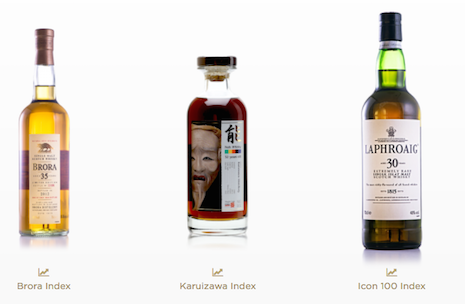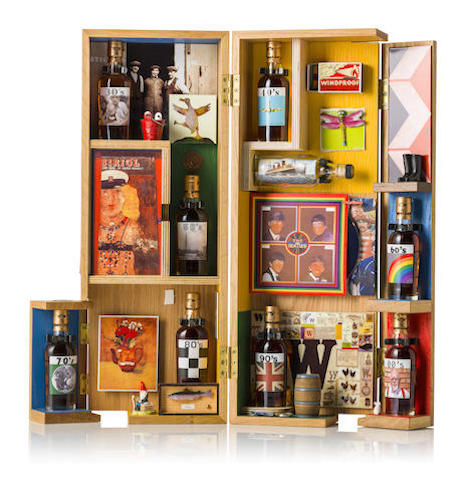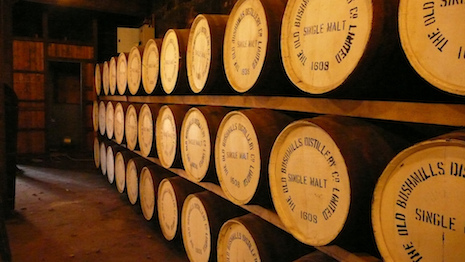Affluent consumers' appetite for rare and valuable vintages of whisky is growing in both volume and value this year, rising by more than 90 percent, according to a new report from Rare Whisky 101.
The first six months of 2017 have seen demand for rare and vintage whiskies at auction reaching an unprecedented high. According to Rare Whisky 101's figures the current market for single malt Scotch whisky is at an all-time half year high.
“Never has the secondary market for rare whisky been so strong, and we expect the value of Scotch sold at auction in the UK to break 20 million pounds this year for the first time ever," said Andy Simpson, co-founder of Rare Whisky 101, Dunfermline, Scotland.
“At a brand level, individual producers are continually pushing the prices of their premium aged stock," he said.
"Couple this primary market price inflation with increased global demand and declining stocks of discontinued bottles, and we still look to be in the ‘perfect storm’ for the right bottles to continue to appreciating in value.”
Whisky demand
Rare whiskies can be a hot commodity among ultra wealthy buyers, routinely selling for thousands of dollars.
Rare Whisky 101 has been chronicling which bottles go up for auction and for how much over the last year. The data it found showed that there has been explosive growth in the demand for rare whiskies.
Just a cursory glance over the numbers shows that sales of rare whiskies at auction are up by 93 percent in the first half of 2017.
What is more is that the average price per bottle has risen from 217.56 pounds in the first half of 2016 to 286.13 pounds in the first half of 2017, or $280 to $369 at current exchange rates.

Some of Rare Whisky 101's collection. Image credit: Rare Whisky 101
This growth is also reflected in the most expensive bottle sold each year.
The previous most expensive bottle of Scotch sold was in 2015, fetching 17,000 pounds, or $21,970 at current exchange rates. This year, that goal was far surpassed by a 50-year old Macallan which sold for more than 65,000 pounds, or $84,000 at current exchange rates.
This growth has also extended to Asia, which traditionally sees less demand for rare whiskies. But this year, a Japanese bottle of Karuizawa sold for more than 100,000 pounds, or $129,200 at current exchange rates. The growth of the market for rare whiskies clearly seems to be a phenomenon not restricted to a single region.
Global phenomenon
This unprecedented growth has actually been boiling up for the last year or so.
More distilleries and auction houses are beginning to modernize, introducing new tools for seeling whiskies such as digital marketplaces.
For example, Bonhams’ Hong Kong saleroom hosted the company’s first online-only auction of whiskies.
From Feb. 17 to March 10, consumers were able to bid on more than 70 vintage lots from Scotch whisky maker The Macallan. Auctioneers are increasingly turning to online channels to sell to collectors, opening up their sales to a wider audience of international bidders (see story).

The Macallan 8 Decades - Sir Peter Blake. Image credit: Bonham's
For its contribution to the new methods of selling whiskies, Rare Whisky 101 has launched a new program that helps connect dedicated whisky collectors with sought-after “dormant casks" of the spirit that may be hidden away in storage or warehouses.
Desire for rare whiskies has been growing steadily over the years, and elite collectors often seek the kind of whisky that cannot be found at the local liquor store's shelves. Rare Whisky 101 purports to be able to connect customers with elusive casks that have been filled right after distilling but for whatever reason have yet gone unsold (see story).
“Of course, as with any investment asset experiencing such a run, it all could come to an end," Rare Whisky 101's Mr. Simpson said. "But right now, the right bottles of Scotch seem to be in ever increasing demand.
"With so little significantly aged stock still maturing in the cask, it’s unlikely we’ll see prices easing for rarities in the short to medium term,” he said.
{"ct":"ZQQAKuyhSNrI+CjNhbt7hRpaidSnpVv38f1xagN81ZnFx0mgQL5PbQz8xsJ2otn4xOhj4oBYkGyKPBgLtKRxjpCwkh99iPuOLCV\/0sML1aIRnouNQIJrgkWGWMEErd+UIxCYWTflFYrWGcz9CMpabYL3Ben1yXN9CZ9WmQqwITQ9jmxukD4liGxfrki2LDWKbSmO3X+3BNEx4arLC9+lZqYCNBuJDchaxOFuVjxDT+MLGyt1wHtifXLeCXFrz7AH6465xAIaHf3H+zADgQfoM8x0FAPM2U62RrnR2h0WY042i4ir898mXE0B1qVzR5s6GLj+\/aycXtitX6VDIwBTqdPMJ8pwOl7E5jQzctNeqe9BIy3WS4PIFDf0jOw524WixhjrByxpqMwYci5Mkoy355fRsCRCO9ULnkvi8OrFyXOtlo15PkpYsmzcuOj7l4nuwCR6MZp\/iwc8w6cyJg7wnhjBWiC8yIGYvL3bPGPSBZT051cULpRWGB21VAI9dYRSba1Sz1awmUyrvcwLIhtJIdpjZ87VuoqgZSCLTkj\/zeloN2lUMBUD2uJl7Bo2pIhq1VP1+9ibunFoEJDNLIviMZSL+LcloVpP+QsX1GSjwKgEw8snJFCKb\/uF57Mf8hUkxw0F5h4UZ7+i0zrNkBoyvnMSSoBy81F2CGCrATRIii25RZxZVt2bL+Zj45ulzgWVwqrU1D4iqC9nhmJByYxMBfOmkjMY65uz5vSyl5CisSOl5L\/vCRoT\/UwwYeE02pQGgbRwkju01aPwBaXO817RJG8LUinfG3d25hHpgYDjixLd6Bya8SrMtWJbPMd5IXxqf7ZLK1WaZBB5nrKXf\/5bImFbhC8hKK5CdBdj9OMsT7NApOBptztrMc3wfRG82Lf0XQMm8j48VLjojCMkfM4chLc2r3gkKDeIIojLQ7os99phiQuOJoXPo20ox+6vH9MprkS78CG6\/YTD+X1Tj6lVL6BpH7wb4P52iXkqFJKh3PAsNnUcMdMJ4mDiTgZJtayEastmnOz\/QYS+BIr2fltubfwPQgQEm0koGmoKMhu4HFDUEkcBMlYKWuSN\/25s7s3DHf9zeAwcRbzN16mpQ0avJ8+n+Uc\/1yYaRrg45hjDfoQgFyqKmwjgLGtv7LQewmZJvyCJsyBh58g18UehjaNBxNfeU9xne0NUutAstSNTyFqDsk5cTxP\/rCEW56F8YRkQnQwkAVzvYfkXhwOGVtru8vIH7dej8f1cxPMBWuo4OpLO\/HxsoQ+wi4lblu7Wom7QKyC7x94hKdIgheFySXHFOs7Jt2jxjajv0ryR0QckmHmqvMFARMaTt7YgWQGupXcypIZsM+Hvz1lJMir5iMigcHKaCwWLtHGucS7ysPI1MopTb4eNUArRNzvNxbVf3NTHxlpfbMJwDYzkeSNEk+R3xkuK+D3Kn7E\/MQ88ShlyOSLeQelMWuJr8NzTSJMMxjwqC+Z5A1FEjgzh79RMY0aWNt\/vsb1Qqh17baRek+uL59ugCcLjyEwTM8ghDFkQBYJwZ4ktALX5WB0RcVRW6gwaad85+hc49\/\/nsGtkBc45sc6eKyejHnPtuRILOodArwbOD8JMH2Wz0wGNSWn8COBR8nxHG2dkHO+qye1jtCGrqYBPUf819Gp1CpHyYpoewtTgxF3+q2ROyWb1pW24GNARI1dF9WJWxbg8frBdclYHr77KQbRe9eEKr0NTRMKtg8X7uSYmKOXwjw72681ixmW4M1ifhm684Rav9mIXUv0E\/qOB\/tu21rlFXR8lF12ueiMtvA8coScz77U7kE3QUd\/IL+0v7HCU3WWg901gxjZgZDqokcdlVLNZZ8NACuI1PbNubYmJ4+QuPLJOdwQc50\/va5anbFMHx8o4270uFIkr3tOKHffy4YT4P7ao+l5X0mV+dpCVMntI9\/xi5lNJhf+QqJEDjR6ECeGMKNVD05bN6Rqs+7g2vs823mEGVo4JNnp1ZAkMj8ht5EpYsYF78pOq0lHMP4nezSohms9L0I5trzS80Dllv+CjWswEJVX8dBqKjqj2Rl1HeORoWb0FA1J8\/MNpzSfMgHPM+vF9nhDRQ2Cttf2PKBBMBKYZWbp1w5pID9pieMxg28lvdi2Lmko5kBMvQEntYnPRTq3OOpadixvYPi8iCTmDu+AEXDU6JU8bV3wr0wgsCK4NM3bGMUQil6UCUKT2CVYkvVD\/qZxPHqCUrh6XgtUwBLhpuFs5brqSzWjdOKIhP+jJqn9ywENlBTQ6UpOTV9qtFQWXO0ioGrY5wnEI1YuKL0hsF2oHexx7al7yCXwzRGz0zPO8JbaLocNhL\/ersfP3+oxnO68Lzt+G\/FTHisYo60o3Wkp9riQSvKSC1z72aHkQIwsIb5GwZJaD5\/DodwDiH\/1DWB3g2peY9v7tN48Emt4ewCk6fCUFLES9S0ykEh6vzc3VS6H7NLuXxYzaUvmOT4D57ni49kRaXmo6RBUrr1fP+RUGu6XFE576cjiX95MdInQpGMs+NtKCtIhyEMGG0YwPpTchFi1gj73C1ghR+HH31a7InJk7B9L1kjkb5Gjhy6tqtfvwyqB3Hw\/txxB6AVf14XZ3K\/0\/KpagbJOiVCdbBuHGD5jiueYSVyJG+tJ62KpvSy1g0koqihV6M++BhAir4P59ndOSv0YyUof3BcSa7vRQFx8ZQejN+mjMd2i9\/VhO3l5Lg5pwp2IKAfzkohHKVd8QycuTLQydEDPGB\/D2wvjrFyGwdm65fqeGfhINBjM8hDchlSWRu6v0LJGrH3fca2G8fqPlB1TYAEgb\/oO6yy1SsFj1tJwnhh4UloTKYOyU7IZ9JLUQSQ+liXRNiNhOV464WiPuxdEDI+uIRuby37SXMzEvjJ1MZDNWrq9kTJzKN\/91W8GbeDj+CiPVeqaYW\/Xk9dy6hpASM+PJVDek\/6N8cuyXBdlUeIx5U+f7dWoyvgXvCsC7Xc9GpYWh6uKzaSNMw9y2vNWY2OMhN7CMx7wVmSOzHM1KmvmUgDZoEidgGHYE68DGnOkEiR+\/SqvyDVu1SlXHuK+i8rheRamsZySoEco9oElhlkvGJ+EzpcoOeL3rcdFWUMXAjAekLdI6Um7ZGcKeA\/T4YDp3EcZJoHCZ53Tyt7ZyP6z5dAvqOAp+9\/t2AeF+zEjDz1\/JuiyAiirNsAkHzHfVEtky0hGmy1Qk8oqRckAS2wxXoSsSpnmaefZ82Qi6BLqOsS+zolJmmkG9KqNwkHCaQD5u\/4kAKMXLqyA8QbXNQvFSHcZQDSZj\/VqAH\/oczbXBxeMFr27cGhBmQGw3v2hU+meI6VvrQFTrzbpBiencykxRiYnehJxO9\/yPvx6ai87PqyKOqQDtsIpw5PFSWybPbHAQJ4P5aDnNsC0wcysAzMBboJZmuxWXT5gCfRx4aadWfGhk35ZdeRwcbUIhVnIi5An1IH4LUiOh1xxmd8rMmxFSnJB0orkiaAvnSqGe\/jHhsLeVqa6V2KJuL7xIO4ULC3fYMsL2xeFDZ5OKePCbOxzV+dvlUvlurBvLWh7HYIubz\/EH9SWgFL2oOI0CBJ7v9KBrz\/3GJFRYqN14o\/0H3takye9eVjBwQ8kKGMT7yOKiL2dtZQKhxqB4Jk9p1ie80ET4KnLtWdemjnV\/IpDdZmEXRX68qF7Ga1LLfUF9qKmKajdtjl2lMJAHaktWpEDSqidhZQH8a3BO7S1NUxisBABdhK1mvmyFBI29wa+fg+xywX9YdhFMnRVwgnbHZyrU2a\/lSMawZ6PTnJkEB82i+e4S6su+rGOq7d7AIxFQfAxR3UL0VkxATLmI\/nM\/RMYjczA2Uw50eDTKquBBEBWzVl4Ui\/\/\/dm7AOUpLIjxzHnfubVbvx7vRf\/Cugv+yk38ugR37hb9Y7BTvUuS36Bv\/txXlkf0li9Im6vFyZBuhKz06VBIt16KEfL6ypkHR32yuZoufXMqZaFbfqpDF1dmre8IIB29oKzx0FzPukGwVsLdQXdbdb\/+3NO4Dmh0HI6SRwWqQMl6GJUyl3hcKf38rmCvhmFy+sRENumSERPcaJSjQau1ok6\/\/eFpAhD\/t3tLS1WzGLQ8CHeGyf0DE4Zbv+dvlqvw\/YXXX7LEsGxEwtZ4VHVIfEoQ14HOZN9YPpUdpA5coRxEdvpsL\/zfIL9VdzSHTN27QK9wEfITfAPeaHZJ2PxfIeloZ0NZIvz5zjIBl6bCmmoiLtK4s0MVgpEFSqt9C5350gAV6Ucxkt2\/6COUkbG3EuJ7hJ+OUdvn\/8s071xZPPl3VeGh4ZM5g0TAfy33B1qVcXQAz6isOg\/B1By52Zp8IaXew+i8CGWYkGjf8RY5+bqhVvHiYWgQ7q2If5v0zxWLV+eDdpsAoUCgl+FqoMZ7BoRMIlfqFtD6ISZHrsI2MuB+BecaKSOPvoW8Pr9xRJs0xXa6TiofBAanM+pFMZsezmJG\/wFxQhIVu87ZQpuFcuURtwIrCw4iLn8mg+or3bprKM7qO\/bs5IqFcflZzUF16m6bJJcznP4ZTo9WGwytQY9sjBYlPm1r3bzixfnx6pBVA+dzbZzXxAGAefNGsTp8zHMVEIFLuW+h7I5mGTrvQielS+HmbcU5hgVeaa9vH6KUKjwjKvq3NTcl1goZHy5ql2OUE8pOtgNb8GN2AnkN\/5YyWKflHG0etsS+vCPKPGu\/i+Uw9KU0hyGYP7qE06ye7gMtnjVF+rF2zuvHGao\/XdKqEZlQraJrIdbP8nZgYtYodzRgXDqaB2NjjNJxw65z4yVQ8Px5NIfh1oExUCkXPNw2zXIvVB0QSxjAJm6vmI3lYdkiDllmrIhToiLLrsvuH7LhS4\/KCl\/gwKBOvwPUvqKAQg7HupMUiOqI+29CP65hDpTV6wg21oaHpdb6re9vFfp0GMq0Z2fQII9LJxgf2ZDrr4kfLn\/pnqwgNWoFLJ\/vj\/xrREwAYxJe\/aehH2CVqhQUGLMPiW8SVhnKQNMnl7O86dudfoTPwSNWILNXPK21LF+m3QZ4eU1o47dWUtp+5eKQhcaQ4E1IUpKaOHIpUWnTuV2djx\/qNjHMydHwdcgcgp9m8ZVLvQetRPNFEA8x6oo5ZjhgzZM1gUD8XB9r89fNhvDw+DcgmVl2WlgDRuhwaIfePsDmFkKGRISsIwjUuzSTv\/HW2AYKfjWM1H5c3tuKowJ4bQZHg6apVMvXqeNmFFKV0BoRlpe3avML7M9bxZnfghjl6HqjTSXa\/d8Sig8icfWYFffuY+bK1WfKENraqNpaqf0FtjbqecmUb+8OiT1\/TBDtOKTt29jpF22bY94CDOQZ82SysVp6z7DhOAmaZi+17H2Ubx4zrdM2866EghcY5Ij9uthX+9jo7k2zYXzY5mqdTmcHrNvbkleZw6pqiHW+elLD50gJWIOy0EIR3P7TiRMUpcdwF6ZEBHJaR1xbzCH0SH\/EOS6MKSswLkpHQ0Clk6AsJFedvkeu17GcxTds9S\/GmZsqa18bLVDSFlbevszfc22H7WFMUkFk63rrQW5M19jT\/1jtahfaHd8tkwP3X8Brwnaoxkk4ZgzVeXmH15KNpa6otIZ07m5tvmtxoci6n1rYZ1oBQC\/qAvGCkbJr7gWcs4IN9G6FSxctl5UNbi3\/C4GoY8fwWY+HWOeEEBeL3AcUZOuve+jUpV8jvzAo4bUcbArZVGeJI2Ic3cB63gEK7XsogtTG0YDKPRO8meZCr9c5sy7TdgeNCsFmAUoZcYmljQ8ZRg6xAaBI6VY9EV54nwZUFLObg8zSVAQ6IaC4ExsbO8Ghmrar5yjM+PGLpTQc98UDhglKWDwo7mpb3Ka6mnR33uVbd4\/VyQO8jgeMrr5tWyBx+fKk0QMN48N+pEHx\/2VSYsmLbEmVZs1v5NVHmU9ctAB2gchMZHR7GqDn53\/3UW7pAP2klXFeBPI9MuqCdaAGtmBSJZRvjqk9+CLsNSskx8XZf8rq\/ssQNGGpGbjLBiREhekk+2Ls9JBivlp6\/X3\/oWgVYzxnMlAZL\/+CDF\/osuwoVHRwmXcQiKI8mJnT5WT8rbz4DUKxbN731MEnFUHVUNeS7xv0EWJ12SuBkHqf\/XYkU\/3E9jwDa2ZjFtJ+6q8M6dqFAJy3FJMTJyq66aR3iInoAe3zjdw1cE7jxhLgCNF\/4pN8SwCTokh1DKEAfdtrxxVx7rZ60sVITT6Yd47rh7yeWYULVsw1tjvSSgnrOyOD72DLpf9wNcyvE86\/\/AQ1GyHIBGMV55\/EP7jQ1OUH9gaqMM9p2BYU2aQkEC10DcJoIAnRPh56+klbmfkOk716\/C\/+o7JdkqhPb1U\/9v8orFNHzUlWeBoUFfUZAFjtesUbfwquO8RWftbnjFLwqBminDHrTRN5zWMOtvHDQxqvsy9RNOgweSISPvMi82jslyOKMXWKLU\/aIUKnoJhvagBp39SqX82Aq+9WPgZItK\/ezh\/qZ3if2U6wu9Owk8rl1r+qRuZIRYl2cjg+PRnfvi\/eCa4VT0sKYtcKWwArG80MGD18J5B01coiO7truAT6RUmZ0rxT03QgjvO8uBdOfcLJzhosrchhK8kF6zB\/DBP2LhGUhs3Iju\/mcgPYFqAQFsQ8N3id56MAZQXd\/62SwXMAE3YrL9n9NF3CK0HXvA4tLhoC09vEWhKjfdPwlJzqLIf16erjb99t2eRTcUkcoRFC72NiU3sms7KKAeVYK5QGFCyeugf2ygD50pT+n3hpX21JcUAqEj07FhXHIqcfJ2igVQ\/PkExmgR0I5ifqj+eooIxSc5eWMlyIeT9HRbMHdSuCCXZpdaNXRQ1UyHcv8GsYixz4VK1WvyfJDRqkfyjMMo\/DzpPPYQPSxxaYPW4pw9svqKN1s\/fSyZkpg6bie3AkEHQ8vy2T8IMPAlWq\/\/Cm2SGCR0qEhLM02XYhMXfyTeJfFGN+\/JwrSUW11kLuHq2J8TJoFVCE+qtRri6DVgofnfAmE5wY0pIkHk\/uVF4dLkO3mhDRXcvATadTLTeF24boj6Ag9vd3rTQ\/QisHPRvj+SbaQyioaboatKI5XQX5eT+3EbQOCwSv1l1INrF4cWFCVInFFhrYCfd2miX9wnMXdV7q\/vD1x2q41SkrCvFWJM0lyYCP8AAT8OOiET1a3zddH1+iBkxg0kwozomyHBOBn2pB6\/\/d726fJhr7d6Jjde7hGzT\/JCQBlWNF1i4AuSGHBYHDbfxuXkv4SxT6mb4kFx3f+r7VBJKq8rg6xNnmhi3IxDB9Pm+kl9oc9c4P0opoAukhgokPWsLDIzrcSVbDISQbAF++VJOrlc3tuTL4YuOG\/Ifwz3MMMAJ4CT5jb2SKzP9KLWVm79ERFV6ixIWr92kXZmpkgGXH\/MJfxbT2rrc5c+uXV85uHWqHGEBx1Pu5a6kNucx0AzjLHdGejP+426LPoycx3jTFmk9Se3tSfn8j6WnxRnLM+GJQiGvK003u0pHhFa82IaQT4xtCKEdQ=","iv":"b2f9053564d7086c51839a0266950c43","s":"58350bb0cba9a156"}

 Demand for rare whiskies and scotch has grown by more than 90 percent. Image credit: Rare Whisky 101
Demand for rare whiskies and scotch has grown by more than 90 percent. Image credit: Rare Whisky 101